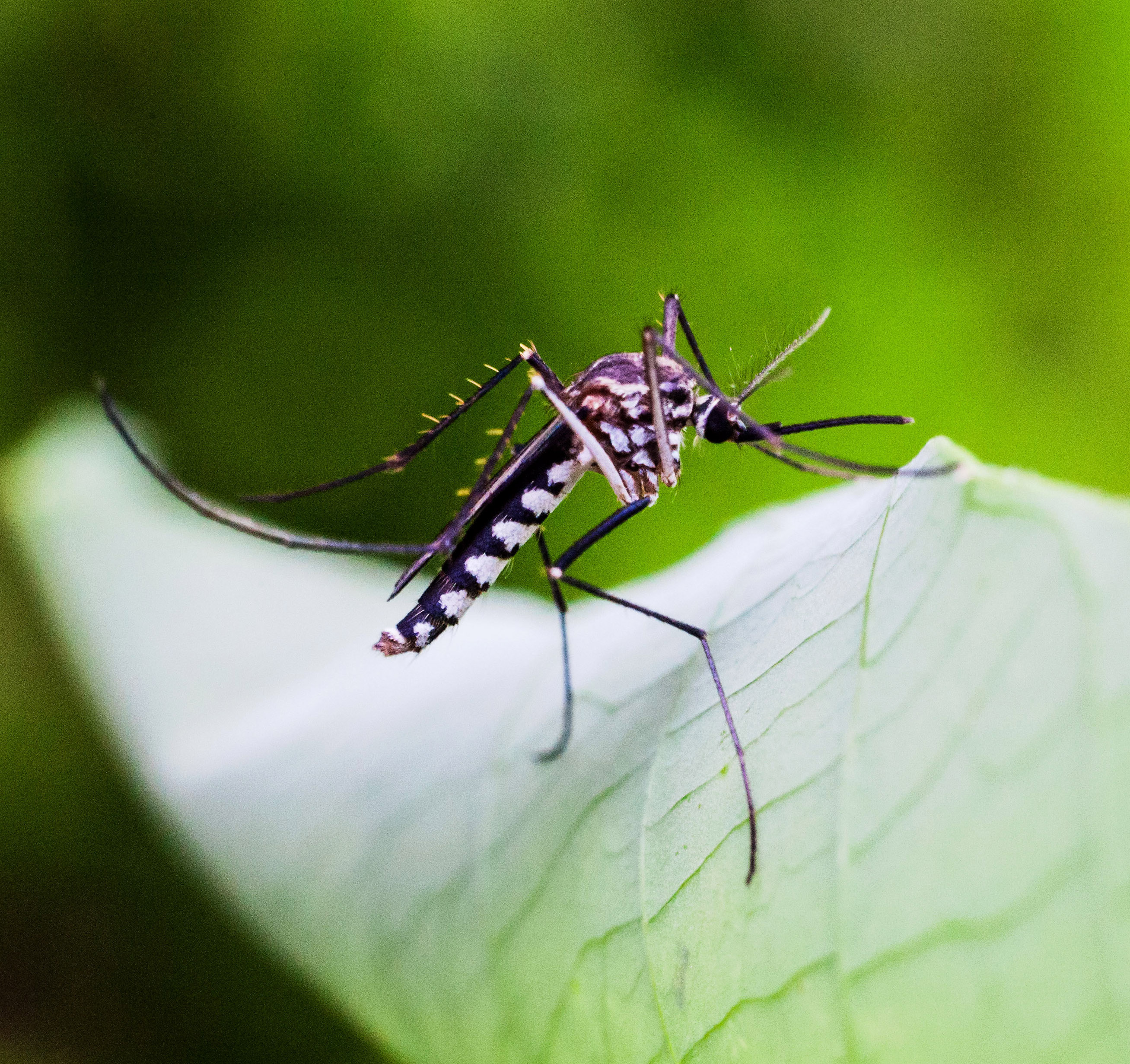
Learn More
Sign up to receive future issues of Your Health Matters.
View the e-mail version of this newsletter.
Got a question or concern? E-mail us!
In this Issue
--Good'n'Healthy: Try Vegetarian Kale Salad!
--Everyday Health: Sun Safety
--Matter of Fact: Steps for Healthy Swimming
--Health Awareness: Zika Awareness
--Events: Elder Pride 2017 is almost here!
Try Vegetarian Kale Salad!
Try this delicious, nutritious, and easy recipe. Since kale is such a hearty green, it can sit in the fridge, dressed for several days and still taste amazing.

Ingredients:
⅓ cup of nutritional yeast
1 chopped avocado
2 cups of sliced almonds
⅓ cup fresh squeezed lemon juice (2-4)
1 teaspoon of salt
1 cup of extra-virgin olive oil
1 cup of sesame seed oil
4 cloves are garlic, crushed and peeled
10-12 ounces of washed and dried kale
1 ½ cups of parmesan cheese
1 cup of sunflower seeds (optional)
1. In a toaster oven or pan, toast almonds until they’re golden brown.
2. In a food processer combine lemon juice, salt, olive oil and sesame seed oil. Add garlic cloves and blend.
3. Add nutritional yeast and the avocado. Blend and set aside.
4. Slice Kale into medium sized pieces and place in a large mixing bowl.
5. Sprinkle almonds cheese and sunflower seeds, if using.
6. Pour half of the dressing over the salad and toss. Taste for dressing/salt and add more as needed.
Refrigerate and serve!
How should you protect yourself from the sun?
UV rays from the sun can negatively affect your skin within 15 minutes of being exposed.

Here’s how to reduce your risk:
- Shade: Look for trees or use an umbrella to protect yourself from the sun. Protective clothing is also a bonus.
- Hats: A brimmed hat is an excellent way to shade your face, ears and the back of your neck. Dark hats provide better UV protection.
- Sunglasses: UVA and UVB rays offer the best protection for your eyes and skin around your eyes.
- Sunscreen: Use broad spectrum sunscreen with at least 15 SPF before you go outside. (even on cool days) If you’re exposed for more than two hours and have been swimming or sweating, the sunscreen can wear off; make sure you reapply. Don’t forget to check the expiration date!
To read more, click here.
Remember, when you use a public pool, you share the same water and germs with everyone!
 If you are feeling sick or have diarrhea,
If you are feeling sick or have diarrhea,
stay out of the water.
 Make sure you shower and are clean before you get in the water.
Make sure you shower and are clean before you get in the water.
 The pool isn't a communal bathroom;
The pool isn't a communal bathroom;
don't use it as one.
 Try not to drink or swallow the water.
Try not to drink or swallow the water.
Source: CDC

Clear the pool every hour; everyone has to get out!
- Make sure you have waterproof sunscreen; if you don't, reapply.
- Take your kids to the bathroom! (They won't have a reason to use the pool)
- Stay hydrated and drink water.
- Keep germs away from the pool. If you're changing diapers, do it in the bathroom or changing area.
About Zika
Zika is a virus that spreads to people primarily through the bite of an infected Aedes species mosquito, usually Aedes aegypti. Besides Zika, Aedes aegypti spreads yellow fever, dengue fever, chikungunya, and other diseases. Aedes mosquitos behave differently from other mosquitos. They are active during the day, instead of dawn and dusk like many other species. They are “city-dwellers”, even living inside buildings, and they only need a drop or two of water to lay their eggs. The word Aedes comes from the Greek word meaning “unpleasant”.


- Zika virus is primarily spread to people through the bite of an infected mosquito. A mosquito becomes infected when it bites a person already infected with Zika. That mosquito can then spread the virus by biting more people.
- Many people who get infected never have symptoms. In people who get sick, symptoms (fever, rash, joint pain, and red eyes) are usually mild and last several days to a week.
- Zika can cause serious birth defects in babies born to women who were infected with Zika virus during pregnancy.
- Research suggests that Zika is strongly associated with Guillain-Barre syndrome (GBS), a rare disorder that can cause muscle weakness and sometimes paralysis.
- Zika can be passed through sex from a person who has Zika to his or her sex partners. Zika can be passed through sex, even if the infected person does not have symptoms at the time.
- Because there is no vaccine or treatment for Zika, people living in or traveling to areas with risk of Zika should take steps to prevent infection.
Prevent mosquito bites
Everyone living in or traveling to areas with risk of Zika should take steps to prevent mosquito bites.
- Cover exposed skin by wearing long-sleeved shirts and long pants.
- Use EPA-registered insect repellents that contain one of the following active ingredients: DEET, picaridin, IR3535, oil of lemon eucalyptus, para-menthane-diol, or 2-undecanone. Always use as directed.
- Pregnant and breastfeeding women can use all EPA-registered insect repellents according to the product label.
- Do not use insect repellent on babies younger than 2 months old. Mosquito netting can be used to cover babies under 2 months in carriers, strollers, or cribs to protect them from mosquito bites.
- Do not use products containing oil of lemon eucalyptus or para-menthane-diol on children under 3 years old.
- Adults: spray insect repellent onto your hands and then apply to a child’s face.
- Use permethrin-treated clothing and gear (boots, pants, socks, tents). You can buy pre-treated items or treat them yourself.
- Stay in places with air conditioning and window and door screens.
- Sleep under a mosquito bed net if air conditioned or screened rooms are not available or if sleeping outdoors.
- Take steps to control mosquitoes in and around your home.
Aedes aegypti can be recognized by white markings on its legs and a marking in the form of a lyre on the upper surface of its thorax.
 Prevent spread through sex
Prevent spread through sex
Prevent sexual transmission of Zika by using condoms or not having sex.
- Condoms can reduce the chance of getting Zika from sex.
- To be effective, condoms should be used from start to finish, every time during vaginal, anal, and oral sex and the sharing of sex toys.
- Zika can be passed from a person with Zika before their symptoms start, while they have symptoms, and after their symptoms end.
- Pregnant couples in which one or both partners live in or have traveled to an area with risk of Zika should use condoms or not have sex during the pregnancy. This is important, even if they do not have symptoms of Zika or feel sick.
- Anyone living in an area with risk of Zika who is concerned about sexual transmission can use condoms or not have sex.
- Anyone who is not pregnant or trying to get pregnant who wants to avoid getting or passing Zika during sex can use condoms every time they have sex, or, not have sex.
- The recommended period of time for taking these precautions will depend on the person’s or couple’s situation.
Pregnant women: Get tested for Zika
- Pregnant women who traveled to an area with risk of Zika that has a CDC Zika travel notice should be tested for Zika even if they do not have symptoms.
- Pregnant women who traveled to an area with risk of Zika that doesn’t have a CDC Zika travel notice should be tested if they develop symptoms of Zika.
Discuss pregnancy planning with your healthcare provider
talk with their healthcare providers about their pregnancy plans during a Zika virus outbreak.Men and women who are considering pregnancy and who live in areas with risk of Zika should
Current Zika Outbreak

- Zika outbreaks are currently happening in many countries and territories. The mosquitoes that can become infected with and spread Zika live in many parts of the world, including parts of the United States.
- Specific areas where Zika virus is spreading are often difficult to determine and are likely to change over time.
- If traveling, please visit the CDC Travelers’ Health website for the most recent travel information. Go to: cdc.gov/travel/page/zika-travel-information.
Zika Symptoms
Many people infected with Zika won’t have symptoms or will only have mild symptoms. The most common symptoms are
- fever
- rash
- joint pain
- red eyes
Other common symptoms include muscle pain and headache. Symptoms can last for several days to a week. People usually don’t get sick enough to go to the hospital, and they very rarely die of Zika. Once a person has been infected with Zika, they are likely to be protected from future infections.
If you get sick
If you feel sick and think you may have Zika talk to your doctor right away; especially if you develop symptoms (fever, rash, joint pain, or red eyes).

Join us at the Baltimore Pride Festival on Sunday, June 18 in Druid Hill Park to celebrate the journey of our LGBT elders. Read More Here!

On Saturday, June 24th from 8-10 AM the Pansexual folks of Baltimore are gathering for a breakfast in Towson! Register Here!!







